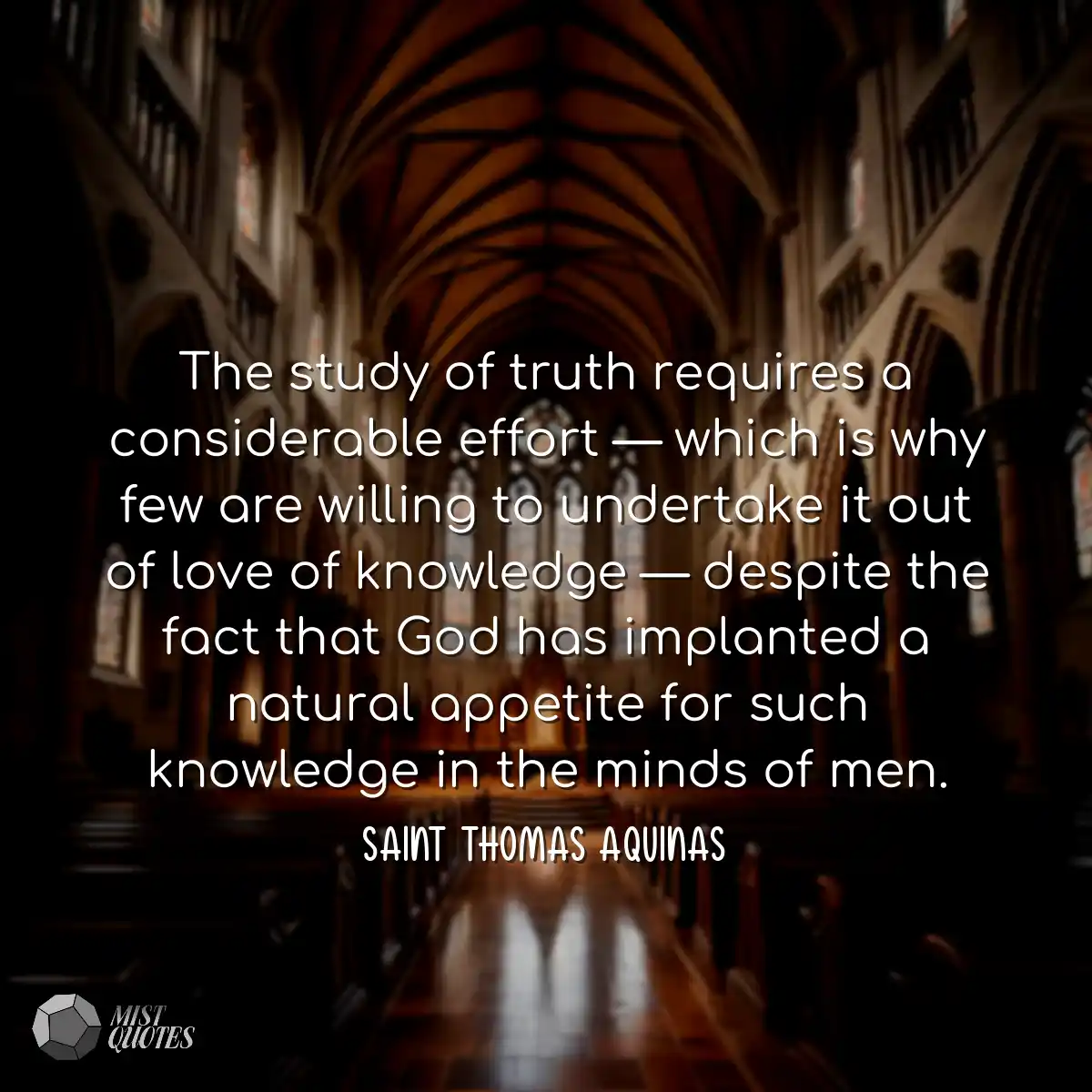
Saint Thomas Aquinas
Philosopher, Priest, Theologian, Writer, Doctor, Jurist

To one who has faith, no explanation is necessary. To one without faith, no explanation is possible.

Fear is such a powerful emotion for humans that when we allow it to take us over, it drives compassion right out of our hearts.

The things that we love tell us what we are.

If the highest aim of a captain were to preserve his ship, he would keep it in port forever.

The study of truth requires a considerable effort — which is why few are willing to undertake it out of love of knowledge — despite the fact that God has implanted a natural appetite for such knowledge in the minds of men.

To live well is to work well, to show a good activity.

Wonder is the desire for knowledge.

Three things are necessary for the salvation of man: to know what he ought to believe; to know what he ought to desire; and to know what he ought to do.

The soul is like an uninhabited world that comes to life only when God lays His head against us.

Man cannot live without joy; therefore, when he is deprived of true spiritual joys, it is necessary that he become addicted to carnal pleasures.
St. Thomas Aquinas, a towering figure in medieval philosophy and theology, made indelible contributions to Western thought that continue to shape intellectual discourse today. Born in 1225 in Roccasecca, Italy, Aquinas emerged as a prolific scholar, theologian, and philosopher during the High Middle Ages. This article delves into the life, accomplishments, and enduring influence of St. Thomas Aquinas.
Aquinas belonged to a noble family and received his early education at the Benedictine monastery of Monte Cassino. His intellectual potential soon became evident, leading his family to send him to the University of Naples. While there, Aquinas studied the works of Aristotle, setting the stage for his later integration of Aristotelian philosophy with Christian theology. St. Thomas Aquinas played a pivotal role in the Scholastic movement, a medieval intellectual tradition that sought to reconcile faith and reason. His masterpiece, "Summa Theologica," reflects his endeavor to synthesize Christian theology with Aristotelian philosophy. Aquinas believed that faith and reason were compatible, and through careful analysis and dialectical reasoning, he sought to demonstrate the harmony between the two.
One of Aquinas's most notable contributions lies in his five arguments for the existence of God, presented in the "Summa Theologica." These arguments, including the cosmological, teleological, and moral arguments, remain influential in discussions of philosophy and theology. Aquinas's rational approach to theology marked a departure from purely faith-based reasoning and showcased his commitment to engaging with the philosophical currents of his time.
Aquinas's exploration of natural law profoundly impacted both moral philosophy and political thought. He posited that ethical principles could be discerned through reason and observation of the natural world. This concept laid the groundwork for the development of human rights theories and continues to influence discussions on morality and law.
St. Thomas Aquinas's influence extended beyond his lifetime. His works became fundamental texts in universities across Europe, and the Thomistic tradition, a school of thought centered around his teachings, flourished. Aquinas's commitment to intellectual inquiry and the synthesis of faith and reason continues to shape the curriculum of philosophy and theology departments in universities worldwide. Recognizing his profound impact on Catholic theology and philosophy, St. Thomas Aquinas was canonized as a saint by Pope John XXII in 1323. He is now considered the patron saint of universities and students, honoring his dedication to knowledge and education.
St. Thomas Aquinas's enduring legacy lies in his ability to bridge the gap between faith and reason, contributing significantly to the development of Scholastic thought. His synthesis of Christian theology with Aristotelian philosophy, his arguments for the existence of God, and his exploration of natural law have left an indelible mark on Western intellectual history. As we continue to grapple with questions of ethics, theology, and the relationship between faith and reason, the teachings of St. Thomas Aquinas remain a beacon of insight and inspiration.
Recent Quotes
"To help a friend in need is easy, but to give him your time is not always opportune."
Charlie Chaplin
"Life can be wonderful if you're not afraid of it. All it takes is courage, imagination… and a little dough."
Charlie Chaplin
